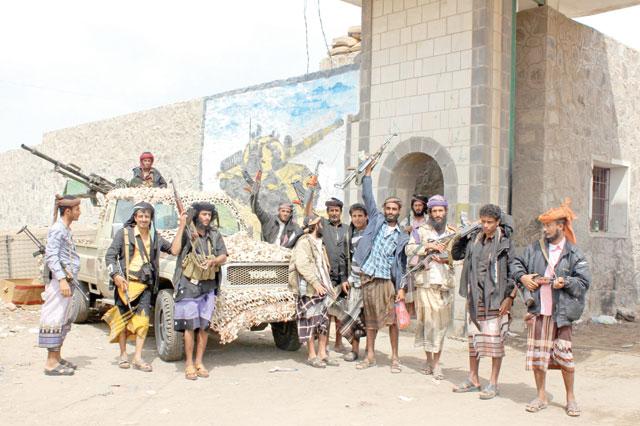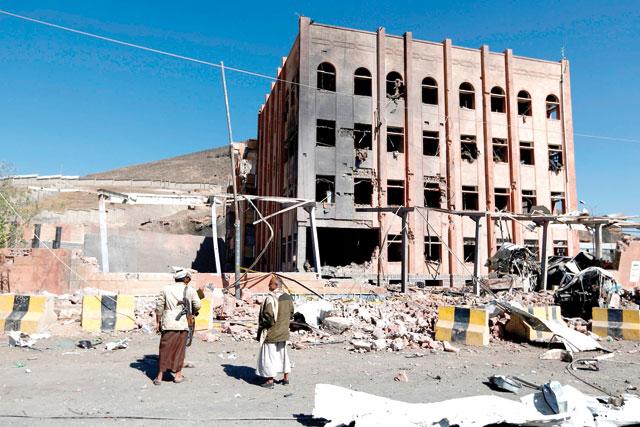You are here
Yemen gov’t warns of coup as separatists take over headquarters
By AFP - Jan 28,2018 - Last updated at Jan 28,2018
ADEN — Yemen’s government accused southern separatists of an attempted coup on Sunday after they took over its headquarters amid fierce clashes in the city of Aden.
The fighting, which killed at least 15 people, threw war-torn Yemen into further chaos and threatened to undermine President Abed Rabbo Mansour Hadi, who ordered his forces to stand down.
Security sources and residents said clashes appeared to have spread to most of the city.
The government urged the Saudi-led military coalition, which has been supporting Hadi against Iran-backed Houthi rebels who control much of the north, to intervene.
The southern separatists — who want the return of an independent state that ended with Yemen’s unification in 1990 — backed Hadi’s government against the Houthis but tensions between them had been rising.
“A coup is ongoing here in Aden against legitimacy and the country’s unity,” Prime Minister Ahmed Bin Dagher said in a statement.
Shortly afterwards, it was reported loyalist commanders had received orders from Hadi to disengage.
“After talks with the Arab coalition... you must order all military units to cease fire immediately,” a government statement said.
On Sunday afternoon, coalition planes flew over the city.
Security sources told AFP that pro-separatist units trained and backed by the United Arab Emirates had taken over the government headquarters in Aden after clashes.
The 15 dead included three civilians, hospital sources said. Dozens were wounded.
Doctors Without Borders tweeted that one of its facilities in Aden had received 86 wounded and four dead, one a woman.
Saudi and Emirati troops present in Aden did not intervene, security sources said.
Separatist fighters and supporters danced at an intersection as truckloads of armed men drove through the streets.
In the late afternoon, security sources said separatists approached the presidential palace where several members of the government were staying, but no clashes were reported.
The fighting erupted after separatist protesters were prevented from entering the city for a rally to demand the government’s ouster from Aden, which became its interim capital after the Houthis seized Sanaa in 2014.
Schools, airport closed
The coalition, which launched its intervention against the rebels in March 2015, had urged restraint ahead of the planned protest.
It called on all sides to “adhere to the language of calm dialogue”, the Saudi state news agency SPA said late Saturday.
Universities, schools and Aden’s only international airport had all been closed, witnesses said.
The UN children’s agency UNICEF said on Twitter it was “very concerned about the situation in Aden”.
Dagher said events there were headed towards “total military confrontation” and urged coalition members, in particular the UAE, to act.
He also warned that separating south Yemen from the rest of the country would benefit the rebels and Iran, which was “trying to consolidate its presence in Yemen through the Houthis”.
Sunday’s rally was called by the Southern Transitional Council, an autonomous body aimed at overseeing self-governance among southern provinces.
The 26-member council, which is not recognised by Hadi’s government, includes the governors of five southern provinces and two Cabinet ministers.
Former Aden governor Aidarous Al Zoubeidi formed the council in May after Hadi fired him.
The council had asked Hadi to make changes in the government and gave him one week to do so — a deadline that expired on Sunday.
Long campaign for secession
It had warned that if Hadi did not accept the demand, its supporters would begin a protest campaign to oust Dagher’s government.
The separatists have long campaigned for the secession of southern Yemen.
South Yemen was independent — with former British colony Aden as its capital — from its formation in 1967 until 1990, when it was unified with North Yemen under northern leader Ali Abdullah Saleh.
Four years later, it launched a separatist rebellion that culminated in its occupation by northern forces.
The Houthis, a northern Shiite minority, seized Sanaa in September 2014 with the help of Saleh and army units loyal to him.
In March 2015, the rebels advanced on Aden, where Hadi took refuge after escaping from Sanaa.
But the Saudi-led coalition helped pro-Hadi forces oust the rebels from Aden and four other provinces in July that year.
Hadi loyalists have been boosted by the Popular Resistance alliance of southern separatists and tribesmen after the rebels advanced on their regions.
Years of UN-backed peace efforts have failed to resolve Yemen’s conflict, which has killed more than 9,200 people and devastated a country already among the region’s poorest.
The Houthis have increasingly consolidated their grip on Sanaa and the north, especially since rebels killed Saleh in December after their alliance collapsed.
Related Articles
ADEN — Yemeni ministers were holed up in Aden's presidential palace on Wednesday after separatist forces seized effective control of the sou
ADEN — Yemen's prime minister appealed on Wednesday for reconciliation with southern separatists after deadly clashes last month in which th
ADEN — Separatists in war-ravaged Yemen have surrounded the presidential palace in the government’s de facto capital Aden, moving closer on














